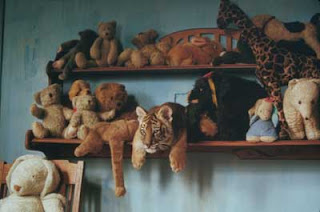Two Brothers (2004)

Two tigers of a tale
Walt Disney has made many films about animals, both real and animated, and not a few have enjoyed watching them. French Cinema has its own share of animal pictures as well, and although they are smaller in number, they still are far better than the best the Americans have come up with. The reason, of course, is poetic touch.
Fans of the French Film Festival will have fond memories of Hanuman and Traveling Birds. In 1996, Microcosmos stepped on new grounds, as it featured delightful vignettes on what being an insect is all about. The trend, though, started with The Bear by Jean-Jacques Annaud in 1988.
The Bear became both a commercial and critical success so that it is no surprise really that the Oscar-winning director should follow it up with Two Brothers 16 years later, which is about another fearsome predator, the tiger, or in this case, two tigers.
Annaud cleverly sets Two Brothers in the jungles of Cambodia, in a moss-covered temple that was once the seat of a mighty empire. It instantly stokes our romantic, adventurous spirits. It's within these sacred stones that The Great Tiger makes his kingdom and refuge with his Tigress and their two cubs, Kumal and Sangha. However, as man's greed knows no bounds, he invades the temple and breaks up this family of four.
Thus begins the adventure of Kumal and Sangha that will bring them into the midst of men, many of whom have no heart and soul although there are those who believe that both cubs deserve to live in the temple and to untamed freedom.
The first half shows why the French are arguably the experts in cinema. They know only too well that film is a visual language. And those lyrical and captivating scenes where Kumal and Sangha explore their surroundings under the watchful gaze of the Tigress, with virtually no dialog, is proof of this mastery.
The musical score of Stephen Warbeck (who won an Oscar for Shakespeare in Love) only adds more to the magical quality of the movie.
It is quite unfortunate that Annaud's collaboration with Hollywood comes out much too evidently at the latter half of Two Brothers, turning an otherwise excellent movie into your average popcorn flick. Which nearly ruins the film. But the tigers save the day and that's all that matters. Never mind if the talented Guy Pearce (the lead actor in the film) is overshadowed. You don't often see movie stars in four legs growling frequently and acting this good.
(First published in Inquirer Libre on December 9, 2004)
Walt Disney has made many films about animals, both real and animated, and not a few have enjoyed watching them. French Cinema has its own share of animal pictures as well, and although they are smaller in number, they still are far better than the best the Americans have come up with. The reason, of course, is poetic touch.
Fans of the French Film Festival will have fond memories of Hanuman and Traveling Birds. In 1996, Microcosmos stepped on new grounds, as it featured delightful vignettes on what being an insect is all about. The trend, though, started with The Bear by Jean-Jacques Annaud in 1988.
The Bear became both a commercial and critical success so that it is no surprise really that the Oscar-winning director should follow it up with Two Brothers 16 years later, which is about another fearsome predator, the tiger, or in this case, two tigers.
Annaud cleverly sets Two Brothers in the jungles of Cambodia, in a moss-covered temple that was once the seat of a mighty empire. It instantly stokes our romantic, adventurous spirits. It's within these sacred stones that The Great Tiger makes his kingdom and refuge with his Tigress and their two cubs, Kumal and Sangha. However, as man's greed knows no bounds, he invades the temple and breaks up this family of four.
Thus begins the adventure of Kumal and Sangha that will bring them into the midst of men, many of whom have no heart and soul although there are those who believe that both cubs deserve to live in the temple and to untamed freedom.
The first half shows why the French are arguably the experts in cinema. They know only too well that film is a visual language. And those lyrical and captivating scenes where Kumal and Sangha explore their surroundings under the watchful gaze of the Tigress, with virtually no dialog, is proof of this mastery.
The musical score of Stephen Warbeck (who won an Oscar for Shakespeare in Love) only adds more to the magical quality of the movie.
It is quite unfortunate that Annaud's collaboration with Hollywood comes out much too evidently at the latter half of Two Brothers, turning an otherwise excellent movie into your average popcorn flick. Which nearly ruins the film. But the tigers save the day and that's all that matters. Never mind if the talented Guy Pearce (the lead actor in the film) is overshadowed. You don't often see movie stars in four legs growling frequently and acting this good.
(First published in Inquirer Libre on December 9, 2004)


0 Comments:
Post a Comment
Subscribe to Post Comments [Atom]
<< Home